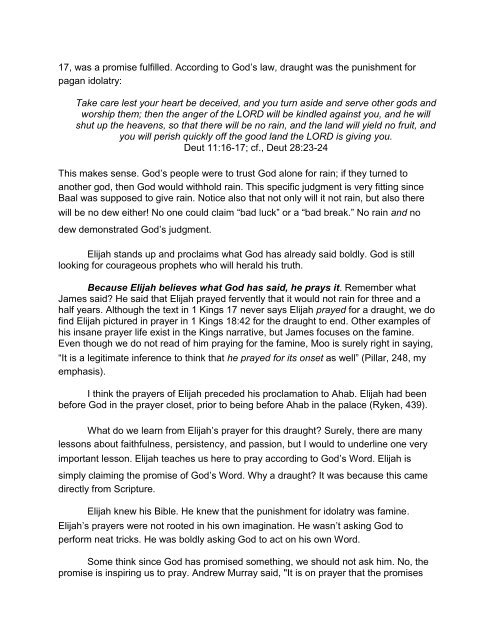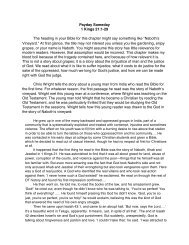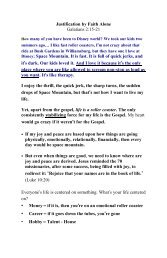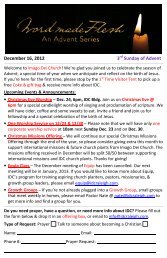Download the sermon notes
Download the sermon notes
Download the sermon notes
You also want an ePaper? Increase the reach of your titles
YUMPU automatically turns print PDFs into web optimized ePapers that Google loves.
17, was a promise fulfilled. According to God’s law, draught was <strong>the</strong> punishment for<br />
pagan idolatry:<br />
Take care lest your heart be deceived, and you turn aside and serve o<strong>the</strong>r gods and<br />
worship <strong>the</strong>m; <strong>the</strong>n <strong>the</strong> anger of <strong>the</strong> LORD will be kindled against you, and he will<br />
shut up <strong>the</strong> heavens, so that <strong>the</strong>re will be no rain, and <strong>the</strong> land will yield no fruit, and<br />
you will perish quickly off <strong>the</strong> good land <strong>the</strong> LORD is giving you.<br />
Deut 11:16-17; cf., Deut 28:23-24<br />
This makes sense. God’s people were to trust God alone for rain; if <strong>the</strong>y turned to<br />
ano<strong>the</strong>r god, <strong>the</strong>n God would withhold rain. This specific judgment is very fitting since<br />
Baal was supposed to give rain. Notice also that not only will it not rain, but also <strong>the</strong>re<br />
will be no dew ei<strong>the</strong>r! No one could claim “bad luck” or a “bad break.” No rain and no<br />
dew demonstrated God’s judgment.<br />
Elijah stands up and proclaims what God has already said boldly. God is still<br />
looking for courageous prophets who will herald his truth.<br />
Because Elijah believes what God has said, he prays it. Remember what<br />
James said? He said that Elijah prayed fervently that it would not rain for three and a<br />
half years. Although <strong>the</strong> text in 1 Kings 17 never says Elijah prayed for a draught, we do<br />
find Elijah pictured in prayer in 1 Kings 18:42 for <strong>the</strong> draught to end. O<strong>the</strong>r examples of<br />
his insane prayer life exist in <strong>the</strong> Kings narrative, but James focuses on <strong>the</strong> famine.<br />
Even though we do not read of him praying for <strong>the</strong> famine, Moo is surely right in saying,<br />
“It is a legitimate inference to think that he prayed for its onset as well” (Pillar, 248, my<br />
emphasis).<br />
I think <strong>the</strong> prayers of Elijah preceded his proclamation to Ahab. Elijah had been<br />
before God in <strong>the</strong> prayer closet, prior to being before Ahab in <strong>the</strong> palace (Ryken, 439).<br />
What do we learn from Elijah’s prayer for this draught? Surely, <strong>the</strong>re are many<br />
lessons about faithfulness, persistency, and passion, but I would to underline one very<br />
important lesson. Elijah teaches us here to pray according to God’s Word. Elijah is<br />
simply claiming <strong>the</strong> promise of God’s Word. Why a draught? It was because this came<br />
directly from Scripture.<br />
Elijah knew his Bible. He knew that <strong>the</strong> punishment for idolatry was famine.<br />
Elijah’s prayers were not rooted in his own imagination. He wasn’t asking God to<br />
perform neat tricks. He was boldly asking God to act on his own Word.<br />
Some think since God has promised something, we should not ask him. No, <strong>the</strong><br />
promise is inspiring us to pray. Andrew Murray said, "It is on prayer that <strong>the</strong> promises







